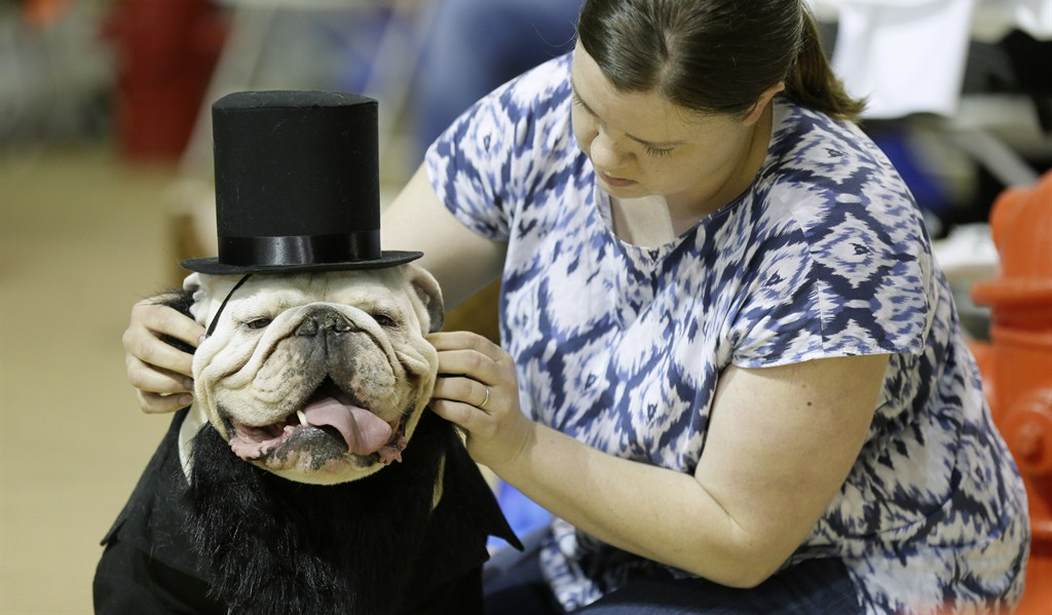If you’re used to flying with fluffy, the DOT is clipping your wings.
As made clear by the U.S. Department of Transportation Wednesday, the Air Carrier Access Act regarding transport of service animals has been amended.
Subsequently, emotional support animals have been banned.
As noted by The Daily Caller, the revised guidelines also involve restrictions on other components of air travel, check-in among them.
And it’s all, according the Transportation Department, to “ensure the safe and accessible air transportation system.”
The decisions weren’t hastily made:
The Department received more than 15,000 comments on the notice of proposed rulemaking. The final rule announced today addresses concerns raised by individuals with disabilities, airlines, flight attendants, airports, other aviation transportation stakeholders, and other members of the public, regarding service animals on aircraft.
But here’s where it gets a little confusing: Though airborne emotional support animals are now extinct, “psychiatric service animals” will still be allowed.
It’s a hairy distinction; here’s USServiceAnimals.org with a well-groomed explanation:
Psychiatric service dogs are not the same as emotional support animals. There are distinct differences between them that will shape who benefits most from each kind of animal.
The main difference between the two comes down to one thing: Emotional support animals (ESAs) are trained to provide emotional support to any person they’re assigned to, regardless of their specific condition and abilities. Psychiatric service dogs are specially trained to assist one specific person with their individual needs, with emotional support being a secondary benefit and not their primary purpose.
Unlike an emotional support animal, psychiatric service dogs are task-oriented service dogs that are recognized by the ADA. While they can provide emotional support to their owners, their main service is to help with tasks that are necessary to the person’s wellbeing and ability to live a normal life. These are tasks that the person would not be able to do on their own, making the dog a necessity.
A psychiatric service dog is recognized by the ADA, and it has rights and privileges that are not afforded to ESAs. For instance, service dogs are allowed inside public facilities, even those that do not allow animals normally. No one can charge extra for providing reasonable accommodation for a service dog to stay near their owner in these situations.
So there ya go.
It’s a sad day for emotional support animal owners, but some were already majorly marginalized.
Take, for example, a lady on a Frontier flight out of Orlando in October of 2018.
TDC reported at the time:
The woman indicated during the reservation process for Flight 1612 to Cleveland that she would be bringing an emotional support animal, but failed to mention that the animal would be a squirrel, as opposed to the more conventional cat or dog.
Personally, I appreciate flying squirrels.
But Frontier didn’t:
“Rodents, including squirrels, are not allowed on Frontier flights.”
It’s too bad they’re not allowed; I’ve had many a flight with some nuts on board.
Nevertheless, that’s the rules. And now dogs and cats have been canned as well.
But you’ve still got at least a few more weeks to ride the runway with Rover: Per Transportation.gov, “The final rule will be effective 30 days after date of publication in the Federal Register.”
After that, if you’re looking for emotional support in the friendly skies, I guess you’ll have to go back to doing it the old fashioned way:
Pilot 'congratulates passengers' for drinking all of the alcohol on board the planehttps://t.co/9SniN4cM4e pic.twitter.com/19zehtvV8d
— The Telegraph (@Telegraph) December 12, 2016
-ALEX
See more pieces from me:
Sex Pistol Johnny Rotten Socializes with Squirrels, Gets Fanged by Fleas – in His Punk Rock Pants
What’s Cookin’: Man is Convicted of a Felony – for Allegedly Trying to Sell Baking Soda
‘Look in the Mirror’: CNN Anchor Douses Democrat Officials for Breaking Their Own Coronavirus Rules
Find all my RedState work here.
And please follow Alex Parker on Twitter and Facebook.
Thank you for reading! Please sound off in the Comments section below.













Join the conversation as a VIP Member